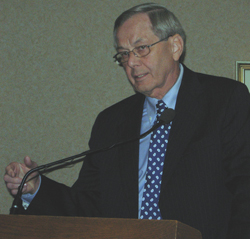 |
Regent Charles Wilson, M.D., addresses the UNMC Delegates during a campus luncheon last week. |
Like a supertanker, the university is large and complex, and changes course gradually after thoughtful consideration.
Dr. Wilson, who has elected not to seek a fourth six-year term, reflected on his 18 years as an NU Regent while speaking at a recent UNMC Delegates meeting.
The UNMC Delegates program — 350 strong — is a national grassroots advocacy program composed of people willing to advocate on behalf of the medical center to federal and state representatives. It is coordinated through UNMC’s Government Relations office.
“Chuck Wilson has been a strong and ardent supporter of increased faculty salaries, programs of excellence, embryonic stem cell research and diversity of faculty and students,” UNMC Chancellor Harold M. Maurer, M.D., said. “He’s also been at the forefront in promoting humanities in medical school education.”
“I have seen an incredible surge on this campus the past 18 years,” Dr. Wilson told the group gathered for last week’s delegates meeting. “A lot of the credit goes to the chancellor who has done an outstanding job.”
Still, he has not done it alone, Dr. Wilson said, noting the contributions made by campus leaders, faculty and staff.
During the luncheon, Dr. Wilson, a clinical professor of medicine with UNMC since 1974, noted the rewards of working with 70 thoughtful and mature student regents who have “added to the conversation.”
He also shared key functions to being a regent: setting appropriate goals for the institution; developing policies and strategies to achieve the goals; and hiring good people to implement them.
|
|
“We are the liaison and arbitrator of the interests and needs of these three groups,” said Dr. Wilson, who has represented District 1 in Lincoln since 1990.
Once elected, however, board members must serve the system, not the district, he said.
“What’s good for the system is good for the state,” he said.
Among the lessons Dr. Wilson has learned the past 18 years:
- The university is a large and complex institution; strategies must be given time to succeed.
- The board’s top goals — academic quality, affordable access and lowest possible cost — tend to compete with each other.
- Quality can be a tough sell because it is nebulous. Costs are specific. “If you want quality, you’re going to have to pay for it,” he said.
- Actions require follow-up. Similar to a Lazy Susan, issues often circle back to the board and must be readdressed.
- Actions often beget reaction, he said, noting the embryonic stem cell debate and how board members have differing opinions.
- Targets — whether it’s salaries, rankings or gender/minority representation — are constantly moving. As NU makes advances, so do peer institutions, thus constant vigilance is needed.
- Events overwhelm the solutions you thought you had, Dr. Wilson said, noting how tuition was increased in 2000 to boost faculty salaries. Soon afterward, the events of Sept. 11, 2001, the economy and state and university budget cuts overwhelmed what the board had tried to accomplish.
Wilson cited several examples of how the board has strengthened the university, including establishing a visionary goal of being one of the top 30 public research universities in the United States (NU is 27th) and bolstering admission standards in the mid-1990s to improve student retention and graduation rates.
“Our intention was not to keep students out, but to make them better suited to succeed,” he said. “The effect has been dramatic. The curve moved upward and has continued to improve every year.”